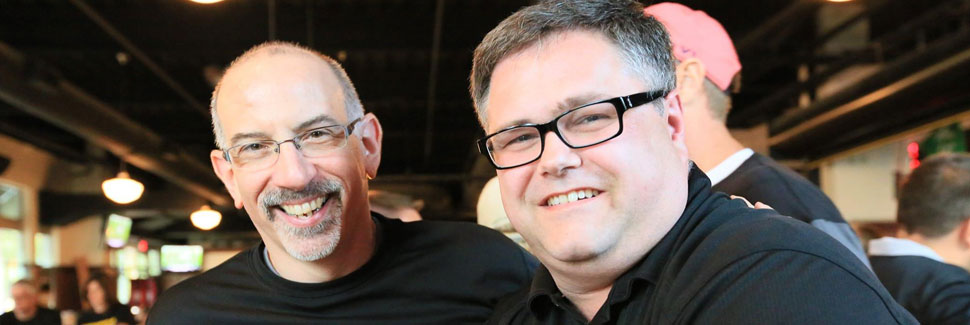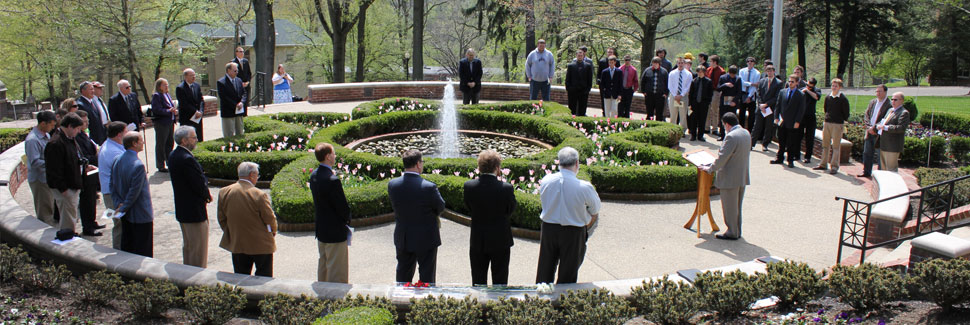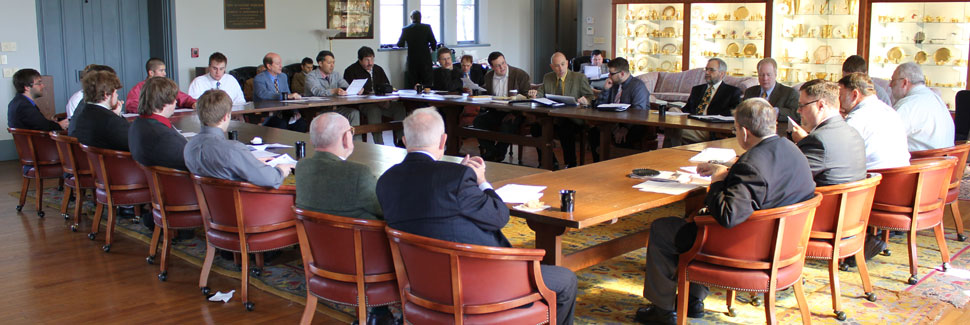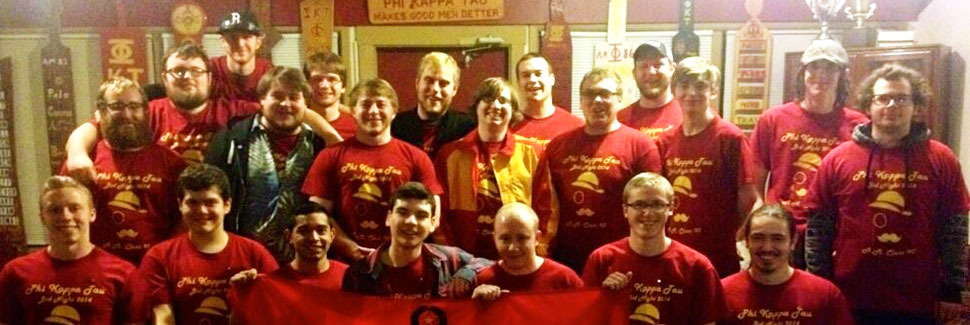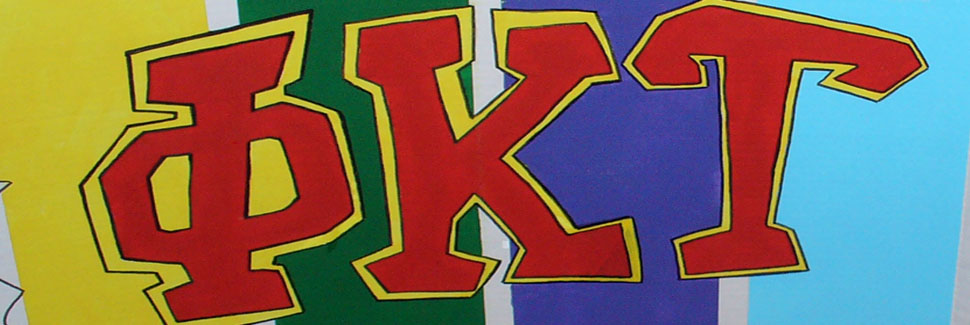History of Phi Chapter
The History below is a collection of remarks from random historical accounts taken throughout the years, including the remarks delivered by Christopher Berry (’86) at the Phi Chapter’s 70th Anniversary Founder’s Ceremony on October 23, 1993.
Three score and ten years ago, the world we live in was a very different place. Though this may seem like a statement of the obvious, we sometimes forget how quickly people’s lives and circumstances change. And although we sometimes believe time stands still here, the part of our world we know as Bethany College is also a very different place. Reflection on the history of our chapter cannot be done in isolation of these two factors. As our chapter has grown, diminished, prospered, and sometimes taken a step backwards, so too has our alma mater and our world.
Yet as constant as change is, it is also comforting to know that there are, have always been, and always will be some constants of Phi Kappa Tau. The bonds, the ritual, and the fellowship that we share are the same, regardless of whether the year is 1910, 1923, 1932, 1945, 1951, 1972, 1983, or 1993.
The Rechabites
To relive the history of Phi Chapter, we must first recall the Rechabites. And to know the Rechabites, we must first turn the clock all the way back to 1910. Europe, with its tangling alliances, was once again becoming a dangerous place. A portly bureaucrat by the name of William Howard Taft had proven to be an unpopular successor to a very popular and egotistical Teddy Roosevelt. And almost 40-percent of all Americans still made their living as farmers.
In the village of Bethany, a men’s dormitory on the west side of Main Street had just been erected in honor of Percy B. Cochran. Philanthropist Earl Oglebay had further shaped the campus by laying the foundation for his famous gates, and central heat via the steam plant had just come to campus.
With only three national fraternities at Bethany, 17 men who desired the fraternal experience formed the Rechabite Club. Their name was derived from a biblical reference to the 35th chapter of the book of Jeremiah and descendants of Recab, a nomad. While the Rechabite Club contained men of good standing, they received little recognition from college authorities. The club did not share in the social privileges that were accorded to the other Greek letter organizations. An even larger problem was the fact that the established fraternities on campus would raid the ranks of the club and recruit some of their best members.
Manhood Demands Purity
To preserve the organization, the college approved the conversion of the Rechabite club into a local fraternity of the same name. The new organization’s pursuits remained the same: “To provide a college home for certain desirable young men, to afford a medium of fellowship, and to develop moral standing and character.” Pretty lofty goals, even for 1910. They adopted the motto “Manhood Demands Purity”, and that remained the guiding spirit in the twelve years of their existence.
In 1923, the globe had been transformed by a world war which had made us “safe for democracy.” Red scares, hot jazz and blue flappers were the rage of the times. Prohibition stopped many of us from drinking – but for others, it simply meant making it at home. Closer to home in Bethany, 300 students were enrolled and had to adhere to a “quality point system” requiring a “C+” average for graduation. Hmm…how many of us might not have made it?
Affiliation With a National Fraternity
The Rechabite Fraternity had continued to grow and felt it was time to take the next step. Along with several other groups on campus, they began the process of affiliation with a national fraternity. The process was interesting in that the club considered and was “courted”, if you will, by several national groups. Perhaps because of the Ohio Valley connection, 16 men of the local group petitioned for membership in the Phi Kappa Tau Fraternity in the summer of 1923 at the National Convention in Lexington, Kentucky. The request was reviewed and approved by the convention delegation, making Phi Chapter the twenty-first chapter overall, and the first in West Virginia.
Initiations and Installations
The initiations and installations of the chapter’s charter members took place seventy years ago next week – the weekend of October 27, 28. and 29, 1923. Interestingly, the activities of that celebration bear a striking resemblance to our own this weekend. The brothers of Phi had to bribe the officials of the town of Bethany a dollar an hour to furnish electricity to the chapter house beyond the standard turn-off time for the festivities. On Friday, the Beta Theta Pi Fraternity entertained the soon-to-be brothers and their dates. (Who would have ever thought the Betas could be entertaining?) Late Friday evening, a “smoker party” (a taboo on campus at the time) raged into the night.
National Founder, Dr. William Shideler
Early Saturday morning, a degree ritual team from the National Headquarters in Oxford, Ohio braved the final seven-mile trek in from Wellsburg on the tracks of the “Toonerville Trolley.” The team included Honored National Founder Dr. William Shideler, who helped initiate our twenty-four founders into the brotherhood.
Later that evening, an installation banquet was held in Phillips Hall, the sisters of Alpha Xi Delta and Kappa Delta graciously serving and serenading the group. Brother J.M. Knappelberd, a National Grand Officer offered words, as did Bethany College President Cloyd Goodnight.
The banquet ended – but the thirst for celebration had not been quenched. Phi Kappa Tau songs (not including the present-day “Ramblers”) were hastily rehearsed and a systematic serenade of all of the sororities on campus commenced. As dawn came to Main Street, one professor noted, “Thank goodness it’s all over, the boys will settle down to work now.” Undoubtedly, Professor John Taylor will utter something similar after this weekend.
By 1932, the Depression was a worldwide reality. In the United States, a charismatic Franklin Roosevelt urged that “we had nothing to fear but fear itself.” Yet 25-percent of the American work force was without jobs; and wages – in an age of no minimum – had plummeted in some cases to five cents an hour.
Back in Bethany, things were not much better for our little liberal arts college. President Serena (and later, President Cramblet) grappled with a half-million dollar operations deficit, a sizable figure for that or any time. Yet Forrest Kirkpatrick had graduated to the ranks of Dean of Men, as had the familiar professorial signatures of Shaw, Stevenson, Knight, and Weimer.
Phi-Tau also managed to just get by, mainly on the shoulders of men with character and ingenuity. Steed Hockensmith worked as Bethany’s mailboy (a National Youth Administration job) for the princely sum of 25-cents an hour. Also up for grabs was the position of waiter/chapter treasurer for the equivalent of half board and chapter dues.
Phi-Tau Glory Barn
Home for the men of Phi was affectionately known as the “Phi-Tau Glory Barn,” a drafty, cramped claptrap that had at one point been Alexander Campbell’s print shop for the Millennial Harbinger. Always strong in sports, Phi managed to beat the Betas in the basketball championship one year, as well as winning in softball and football.
The late 1930’s were dark years for the world, as it once again plunged into world war. Disaster also struck the Phi-Taus, when the Chapter House burned. The good men of this era were not to be deterred, however. By 1938, they had managed to rebuild the house.
Two Unknowns
Membership in the late 1930s had withered at one point to two men. These two unknowns also persisted, and – with the beginnings of a “Louie’s Lunch” at Professor Green’s house – 1940 saw the initiation of fourteen new members. Somehow, the men of this tough era found a way to get through.
Fast forward now to 1945. V-E and V-J Days were at hand, and so was the return of the G.I. Consumers in the U.S., who had spent years rationing everything from gasoline to chocolate, found their pent-up demand could be contained no longer. Cookie-cutter Levittown houses and the automobile begat the suburbs. Baby births skyrocketed creating the demographic group we know now as the baby boomers.
Meanwhile, back on the banks of the Buffalo, another postwar phenomenon known as the G.I. Bill had also reshaped Bethany. Intermingled with the traditional student was a new breed of male – a bit older, a bit wiser, tempered by war, and armed with the knowledge of how to raise a little bit of hell. Many of these men have journeyed back to be with us here today, some for the first time since their graduation.
At the Home of Kirk Woolery
The original Phi Chapter House was abandoned in favor of one in town on Cramblet Street, once the home of Kirk Woolery. Today, it looks much the same as it did then, and is the current home of Bethany Professor of Communications Russ Cook. The classes of 1948 to 1952 account for almost 100 of our chapter’s alumni, nearly 20 percent of the living Phi Chapter Phi-Taus. Phi Chapter began its long tradition of Greek sing wins as the “Boom-Boom-Boomers” took the 1947 Greek Sing and Swing Competition.
Okay, so these rude, crude, and socially unadjusted Phi-Taus didn’t fit Dean Kirkpatrick’s definition of the ideal college man. This group of men left its mark on the fraternity and the campus in athletics with “Head Gear” Martin, and on the musical side, Dick Meess as the chapter roving troubadour.
The names of this era read like a “Who’s Who” of Phi-Tau’s loyal supporters: Engel, Bado, Kammerer; Mewhirter, Laughner, and Higginbotham; LaBella, Dimmit, and Roper; and of course, Dick Meess. Somehow the world survived World War II, and the campus survived the World War II vet.
The late 1950s and 1960s saw the United States emerge as the preeminent capitalist superpower. Rock and roll and the twisting hips of Elvis had parents aghast – and teenage girls screaming. Coke was a nickel, gas was thirty cents, and tuition and expenses at Bethany were…well, still pretty expensive.
In 1953, Perry Gresham was installed as president and dress codes continued to be in effect. A Bethanian could be suspended for having tobacco, alcohol, or a car on campus. Students considered themselves lucky if they had a clock, a record player, or a lamp. In case you’re wondering if things are any different, I would encourage you to check out a room in the current Phi-Tau house. My, my – isn’t technology a wonderful thing?
Phi-Taus: The Jocks on Campus?!
The Phi-Taus of this age could undoubtedly be classified the “jocks” on campus. Most of the intramural awards went to the chapter as Phi Chapter graduated large classes in the years from 1956 to 1966.
In the spring of 1966, another page in our history was turned by the college, as the old chapter house was condemned. Two brothers, refusing to see the writing on the wall – or perhaps trying to save the writing on the wall – stayed to the very end, almost to the wrecking ball.
Campus Protest, West Virginia Style
The late 1960s, which gave way to the 1970s, brought us into the “Age of Aquarius”. “Tune in, turn on and drop out”, “Sock it to me!”, “I am not a crook”, and disco says it all. While Bethany was no Berkeley, the college wrestled with campus protest, West Virginia style. Changing regulations included the abolition of required chapel services and the banning of “conscious expanding” drugs. One new guideline – a true “sign of the times” – said that “road markers and the like were not allowed in student residences unless a bill of sale was immediately available as proof of ownership.”
Home in the Barton Campbell Hagerman House
In old Phi-Tau style, our brothers took up residence on the Old Parkinson Hill in the Barton Campbell Hagerman House. As all things go in cycles, Phi grew from a small but close-knit group to a large close-knit group in these years. At one point in the mid-1970s, the chapter had nearly 60 Resident Council members. New traditions of the Corn Roast and the ever-present Hawaiian Luau became mainstays on the fall campus social scene.
During the pledging period, we all had nicknames – just don’t ask us to repeat them in mixed company. “Funzy” was the word for entertainment. Could anyone ever forget exactly how many trees grew behind Hagerman House? Bottle tossing off the balcony was the official Phi-Tau sport, the Delts were our feuding neighbors, and Bid Day was a celebration soaked in cold beer – or whatever was the cheapest at Kroger’s in Wellsburg. The names and nicknames are the stuff of legend: Grunt and Spike, Vort and Rat, Meyernick and Smedley, Faber and Reet, Laughner and Hodgey, Biscmeoff and Swooper, Troll and Joel-buddy, Spaz and Mongo…the list goes on.
Finally, our past brings us into the 1980s, fast-forward into today. The Reagan Revolution came and went, as did the Soviet Union. Todd Bullard took Bethany into its Second Century and the restoration of Old Main took us back to the future. Equally as important as the restoration of the college structures was the restoration of another Bethany institution: Bubba’s.
Prime Position, Atop the New Parkinson Hill
Phi-Tau also moved into a new phase as it was offered “prime position” atop the New Parkinson Hill. The move into our current chapter house took place ten years ago this fall. At the top of the chapter agenda that fall was to get the college to fix the brick patio and lounge carpet, win the Woolery Cup, and date more Zetas. Eventually, we achieved two out of three – we’re still waiting on the patio and the carpet.
The Harvard Red and Old Gold Club
Greek Sing continued to be all-Phi-Tau with our 19th win in 20 years. We celebrated our 60th anniversary in style with the largest reunion of Phi alumni prior to this weekend. In 1985, Don Dallas, a loyal Phi-Tau from the 1930s, envisioned and made possible the remarkable organization that has become one of the chapter’s cornerstones – The Harvard Red and Old Gold Club. The model of the Harvard Red and Old Gold Club was soon adopted by the National Phi Kappa Tau Foundation, and was set up for chapters across the country. 22 years later, Don Dallas entered Chapter Eternal on July 5th, 2007.
The strong bond shared among the Phi-Taus of the 1980s continues today, as many are the guiding force in our graduate programs. Some are here today, some are missing – Skena and Rash, Blase and Deco, Abby Wad and T.C., Barry and Bud, Stoner and Marshcabelly, C.B. and Captain, Hammond and Bubblehead, Caldwell and Carte, Alexander and Groft, and onward and onward.
Phi Kappa Tau: Leader Among Greek Organizations on Campus
Today, diversity continues to define the men of the current generation: from the radio station and TV-3, to the SBOG, to the stage of Wailes Theater, to distinction on comprehensive exams. We can say without exaggeration that Phi Kappa Tau is the leader among Greek organizations on campus.
In the 1990s, the men of our Resident Council continue to take Phi Chapter to a new level. If you need proof of that, look around you. They exemplify so many of the ideals of our fraternity. How wonderful it is to have a group that we can invest so much pride in, when other Greek organizations around the country fight to survive in the wake of controversy.
Home
We can be equally excited about the resurgence of alumni interest and the formation of a functioning, vibrant Graduate Council. A Resident Council and a Graduate Council need each other. Thankfully, we are here to help guide them in their “living laboratory”, and they have given us into a genuine “home” and reason to come back.
What is yet to be written of the Phi Chapter story remains a mystery. As Kierkegarde reminds us, life can only be understood backwards, but it must be lived forwards.
What is certain is that we can all take pride in what has been our past and more importantly, play a role in our future. We often mistakenly say that we were once Phi-Taus. In fact we are, and will always be, brothers in Phi Kappa Tau – “now and ever, until the day we die.” May we all remember what has been, but find a way to be part of our future.


